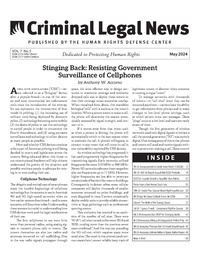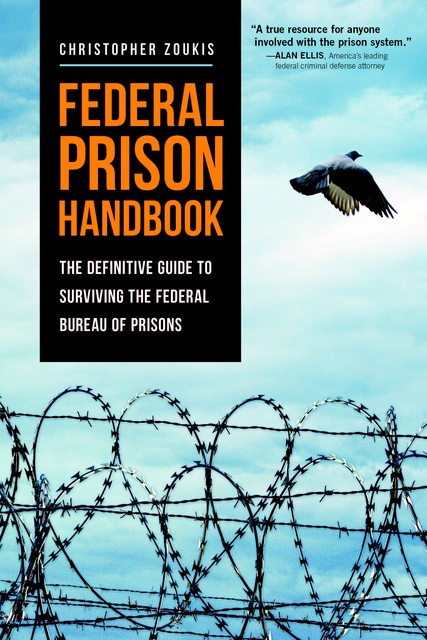by Anthony W. Accurso
A cell-site simulators (“CSS”)—often referred to as a “Stingray” device, after a popular brand—is one of the newest and most controversial law enforcement tools since the introduction of the wiretap. Its use represents the intersection of four trends in policing: (1) the increasing use …
by Douglas Ankney
The U.S. Court of Appeals for the Seventh Circuit held that the U.S. District Court for the Southern District of Illinois erred in conflating the scopes of the no-firearms condition of the “safety valve” of 18 U.S.C. § 3553(f) and the firearms enhancement of U.S. …
by Michael Dean Thompson
Cellphones must be able to continue providing service when connected to networks other than those to which their owners subscribe. The ability to roam beyond the subscriber’s borders without interruption of service is available because network providers across the globe have agreed to some …
by Anthony W. Accurso
Cory Doctorow’s latest book, The Internet Con: How to Seize the Means of Computation, discusses the relationship between the failure to regulate tech monopolies in the United States and the meteoric rise of government spying, tying the lack of effective privacy legislation to a …
by Jo Ellen Knott
On January 1, 2024, Assembly Bill 2773 took effect in California. The law requires police officers to tell drivers why they have been pulled over before questioning them on other matters. This aims to curb pretextual traffic stops, where officers pull someone over for …
by Douglas Ankney
The U.S. Court of Appeals for the Fourth Circuit held that Maryland’s first-degree assault statute, Md. Code, Art. 27 § 12A -1, is indivisible, and a conviction thereunder is not a “violent felony” for purposes of the Armed Career Criminal Act (“ACCA”), 18 U.S.C. § …
by Matt Clarke
The National Institute of Justice and independent research consultant Dr. John Morgan collaborated “to analyze and describe the impact of forensic science on erroneous convictions that the National Registry of Exonerations classified as being associated with ‘false or misleading forensic evidence.’ … Findings from this …
by Sam Rutherford
TheSupreme Court of Washington held that the terms “community custody” and “community supervision” are synonymous within the meaning of the second sentence of RCW 9.94A.589(5) for offenses that occurred after July 1, 2000, and that trial courts may not impose consecutive terms of community custody …
by Richard Resch
In a unanimous opinion, the Supreme Court of the United States held that a jury’s verdict of not guilty by reason of insanity is an “acquittal” for purposes of the Double Jeopardy Clause of the Fifth Amendment, despite the fact that the acquittal may be …
by David M. Reutter
The Court of Appeal of California, Fourth District, held that a violation of a prisoner’s constitutional and statutory rights to be personally present at an evidentiary hearing to determine if Senate Bill 1437 prohibits him from being charged with felony murder. Finding the error …
by Jo Ellen Knott
On March 19, 2024, an Egyptian-Muslim woman in Oklahoma filmed an encounter with FBI agents who visited her home to discuss social media posts. The video went viral, sparking debate on free speech and government surveillance. Free speech advocates worry the FBI may be …
by Michael Dean Thompson
Corporations collect all kinds of data about their customers with few rules about what they can do with it. Often, these collections come with assurances that the data will be de-identified before being sold to additional parties such as data brokers. One meaningful example …
by Katya Schwenk
This article was originally published on lever.com on March 29, 2024
Private donors including big-box stores, fossil fuel companies, and tech giants are secretly giving hundreds of millions of dollars annually to law enforcement agencies and related foundations, allowing police to buy …
by Anthony W. Accurso
It has been 10 years since body-worn cameras (“BWCs”) were posited as a solution to the lack of accountability in police murders of citizens, but police are still largely unaccountable, in part because the footage is often difficult to obtain.
At least 1,201 …
by David M. Reutter
With the rate of Americans who have a felony conviction steadily increasing as a result of the incarcerative state’s policies, corporate entities are experiencing a change of heart towards those with criminal records. In fact, many corporations say felons are often the most dependable, …
by Douglas Ankney
The U.S. Court of Appeals for the Tenth Circuit held that John Miguel Swan’s guilty plea was not knowing and voluntary because “his plea counsel materially misrepresented his right to an impartial jury selected through racially nondiscriminatory means.”
While Swan was being arrested on …
by Michael Dean Thompson
Facial Recognition Technology (“FRT”) misuses continue to pop up in the media. In August of 2023, police went to the home of Porcha Woodruff and arrested her for carjacking in front of her daughters. The kicker in her story was that she was eight …
by Douglas Ankney
The Supreme Court of California held that a jury’s finding that Freddy Alfredo Curiel harbored the requisite intent to kill to find true a gang-murder special circumstance, standing alone, was insufficient for a trial court to find that Curiel had failed to state a prima …
by Douglas Ankney
A team of scientists from China’s Shanghai Normal University in collaboration with scientists from the United Kingdom’s University of Bath have developed a fluorescent spray that reveals fingerprints in seconds without compromising any potential DNA evidence. The dyes used in the spray are manufactured from …
by Anthony W. Accurso
The Biden Administration’s rhetoric on justice and human rights issues may sound good, but a new report reveals that the use of solitary confinement—which is often in conditions the United Nations (“U.N.”) has declared amount to torture—is actually increasing in U.S. Immigration and Customs …
by Douglas Ankney
The Court of Appeals of New York held that application of the Sex Offender Registration Act (“SORA”) to Marcus Brown violated his “due process rights by impinging on his liberty interest to be free of the improper designation and registration as a sex offender” because …
by Jo Ellen Nott
The Council on Criminal Justice (“CCJ”) released a December 2023 update to its original report (August 2023) on the impact of the First Step Act (“FSA”) on recidivism. The update separates new crimes from technical violations to give a more accurate picture of how …
by Dale Chappell
As most federal prisoners know, the so-called “Savings Clause” under 28 U.S.C. § 2255(e) is now dead in the wake of the ultra-conservative Supreme Court’s questionable decision in Jones v. Hendrix, 143 S. Ct. 1857 (2023). If you’re not aware, Hendrix ended the use of …
Loaded on
May 15, 2024
published in Criminal Legal News
May, 2024, page 37
We are writing to inform our readers about a serious error regarding the above-titled Column published in the February 2024 issue of Criminal Legal News. We are retracting the Column in its entirety. We sincerely apologize for any confusion the publication of this Column may have caused.
By …
by Sam Rutherford
The U.S. Court of Appeals for the First Circuit held that a defendant’s statement in response to Miranda warnings that “I guess my best bet would probably be to not talk” until she had a lawyer was an unequivocal invocation of her right to counsel …
by Michael Dean Thompson
There is a tendency within the human brain to settle on the first solution even when another, better solution is available. Automated facial recognition (“AFR”) systems can exacerbate the problem simply by the fact that they are designed to address an area where most …
by Douglas Ankney
The Supreme Judicial Court of Massachusetts extended the holding of Diatchenko v. District Attorney for the Suffolk Dist., 1 N.E.3d 270 (Mass. 2013) (sentence of life without parole for first-degree murder committed when defendant was under 18 years of age is unconstitutional), to defendants who …
by Douglas Ankney
The Supreme Court of New Jersey unanimously extended the investigative eyewitness identification safeguards of State v. Henderson, 27 A.3d 872 (N.J. 2011) (articulating a series of variables that can affect the reliability of eyewitness identification evidence and setting forth procedural safeguards), to pretrial preparation sessions …
by Michael Dean Thompson
In 2016, a lone shooter shot 12 Dallas police officers, killing five. Police eventually cornered the man in a parking garage. He had nowhere to go, but after five hours, the cops were eager to end it. So, they strapped the plastic explosive known …
by Sam Rutherford
The U.S. Court of Appeals for the Ninth Circuit held that a defendant’s live-in girlfriend could not validly consent to police searching their shared residence where the defendant, who was detained nearby, yelled to her “Don’t let the cops in, and don’t talk to them.”
…
by Douglas Ankney
The U.S. Court of Appeals for the Sixth Circuit held that an untimely notice of appeal (“NOA”) that provides a reason for the tardiness may serve as a motion to reopen and as a request for certificate of appealability (“COA”).
After Da’Rell Anton Winters’ …
by Michael Dean Thompson
Google is the unrivaled search giant, and its Android is the second most widely used cellphone operating system in the U.S. Their additional offer of free software is all designed to leverage what they know about you and increase the number of opportunities to …
Loaded on
May 15, 2024
published in Criminal Legal News
May, 2024, page 50
Arkansas: WREG reported thaton March 12, 2024, a former policeman with three years on the force in Blytheville was charged with distributing, possessing, and/or viewing materials depicting sexually explicit conduct involving a child. David Paul Cross, 25, was arrested as part of an ongoing investigation by the Arkansas …






